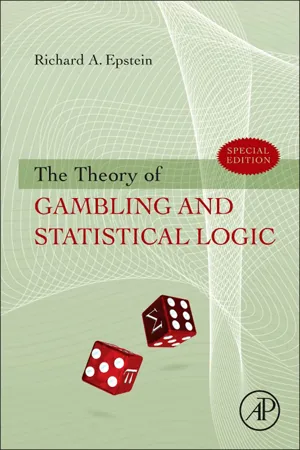
- 465 pages
- English
- ePUB (mobile friendly)
- Available on iOS & Android
eBook - ePub
The Theory of Gambling and Statistical Logic
About this book
Early in his rise to enlightenment, man invented a concept that has since been variously viewed as a vice, a crime, a business, a pleasure, a type of magic, a disease, a folly, a weakness, a form of sexual substitution, an expression of the human instinct. He invented gambling.
Recent advances in the field, particularly Parrondo's paradox, have triggered a surge of interest in the statistical and mathematical theory behind gambling. This interest was acknowledge in the motion picture, "21," inspired by the true story of the MIT students who mastered the art of card counting to reap millions from the Vegas casinos. Richard Epstein's classic book on gambling and its mathematical analysis covers the full range of games from penny matching to blackjack, from Tic-Tac-Toe to the stock market (including Edward Thorp's warrant-hedging analysis). He even considers whether statistical inference can shed light on the study of paranormal phenomena. Epstein is witty and insightful, a pleasure to dip into and read and rewarding to study. The book is written at a fairly sophisticated mathematical level; this is not "Gambling for Dummies" or "How To Beat The Odds Without Really Trying." A background in upper-level undergraduate mathematics is helpful for understanding this work.
- Comprehensive and exciting analysis of all major casino games and variants
- Covers a wide range of interesting topics not covered in other books on the subject
- Depth and breadth of its material is unique compared to other books of this nature
Richard Epstein's website: www.gamblingtheory.net
Frequently asked questions
Yes, you can cancel anytime from the Subscription tab in your account settings on the Perlego website. Your subscription will stay active until the end of your current billing period. Learn how to cancel your subscription.
No, books cannot be downloaded as external files, such as PDFs, for use outside of Perlego. However, you can download books within the Perlego app for offline reading on mobile or tablet. Learn more here.
Perlego offers two plans: Essential and Complete
- Essential is ideal for learners and professionals who enjoy exploring a wide range of subjects. Access the Essential Library with 800,000+ trusted titles and best-sellers across business, personal growth, and the humanities. Includes unlimited reading time and Standard Read Aloud voice.
- Complete: Perfect for advanced learners and researchers needing full, unrestricted access. Unlock 1.4M+ books across hundreds of subjects, including academic and specialized titles. The Complete Plan also includes advanced features like Premium Read Aloud and Research Assistant.
We are an online textbook subscription service, where you can get access to an entire online library for less than the price of a single book per month. With over 1 million books across 1000+ topics, we’ve got you covered! Learn more here.
Look out for the read-aloud symbol on your next book to see if you can listen to it. The read-aloud tool reads text aloud for you, highlighting the text as it is being read. You can pause it, speed it up and slow it down. Learn more here.
Yes! You can use the Perlego app on both iOS or Android devices to read anytime, anywhere — even offline. Perfect for commutes or when you’re on the go.
Please note we cannot support devices running on iOS 13 and Android 7 or earlier. Learn more about using the app.
Please note we cannot support devices running on iOS 13 and Android 7 or earlier. Learn more about using the app.
Yes, you can access The Theory of Gambling and Statistical Logic by Richard A. Epstein in PDF and/or ePUB format. We have over one million books available in our catalogue for you to explore.
Information
Edition
2Subtopic
Applied MathematicsTable of contents
- Cover image
- Title page
- Table of Contents
- Copyright
- Dedication
- Preface
- Chapter One. Kubeiagenesis
- Chapter Two. Mathematical Preliminaries
- Chapter Three. Fundamental Principles of a Theory of Gambling
- Chapter Four. Parrondo’s Principle
- Chapter Five. Coins, Wheels, and Oddments
- Chapter Six. Coups and Games with Dice
- Chapter Seven. The Play of the Cards
- Chapter Eight. Blackjack
- Chapter Nine. Statistical Logic and Statistical Games
- Chapter Ten. Games of Pure Skill and Competitive Computers
- Chapter Eleven. Fallacies and Sophistries
- Epilogue
- Appendices
- Index